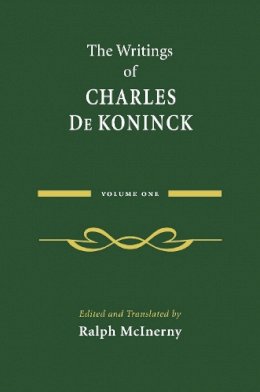Charles De Koninck was on the faculty of Québec’s Université de Laval and was director of Laval’s philosophy faculty from 1939 to 1956. He lectured frequently in the United States, as well as in Latin America, Europe, and Canada.
“DeKoninck's argument here goes well beyond what can be established in experimental science, but it is a great merit of his work that he is careful to distinguish what we know from experimental science, what philosophical reflection on science might contribute, and what further speculation from metaphysics and theology might add to our understanding of the cosmos.” —First Things “By translating these writings into English, Professor McInerny has done a great service to those who are interested in this period of philosophy, and he has made more accessible the writings of a philosopher who deserves a great deal more attention than he has received to date.” —Catholic Library World “This is a book for the philosophy aficionado. Scholastic thinkers who have appreciated the thoughts of Catholic Thomist philosopher Charles de Koninck (deceased 1965, Univ. of Laval, Quebec City) on the relationship of scientific thinking and religious thinking to the familiar world around us will immediately realize that this first volume of a planned three-volume set is a superb selection of his writings. Writings include his dissertation on the philosophy of Sir Arthur Eddington and his unpublished work 'the Cosmos.' His well-known considerations of indeterminism, statistical laws, and causality will trigger questions about consciousness, imagination, and the ability to comprehend the cosmos for decades to come.” —Choice “Ralph McInerny is doing us the incalculable good of making available to a general public the writings of Charles De Koninck. This volume, the first of many to come, begins a chronological presentation of the books, articles, essays, and addresses of one of the strongest and most penetrating thinkers of the last century, who was at once an extraordinary philosopher and theologian, with the profound and simple faith of the proverbial peasant. May we continue now to learn from the great De Koninck, and include in our prayers the intentions of his gracious disciple, who is so felicitously discharging the office of piety to a revered and unforgettable master.” —Ronald P. Mc Arthur, President Emeritus, Thomas Aquinas College “Charles De Koninck, perhaps because of his untimely death, is not as well known to English-speaking readers as Etienne Gilson and Jacques Maritain, but his work belongs to that same world-class scholarship as his notable contemporaries. It is almost an understatement to say that his contribution to the philosophy of science remains timely. Readers are fortunate that his former student, Ralph McInerny, has seen fit to collect and to translate, where necessary, some of De Koninck's most important work for this volume.” —Jude P. Dougherty, The Catholic University of America

